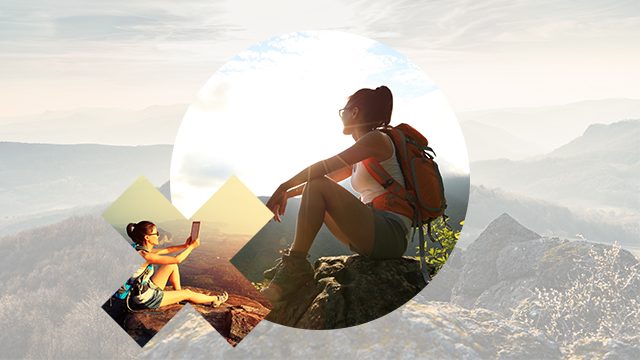SUMMARY
This is AI generated summarization, which may have errors. For context, always refer to the full article.

What do you surrender when you take a photo to share with the world online?
That is not a trick question. It used to be that we just took photos to document the moment – to preserve it in captured light so that we could go back to it and remember. Then if we want to, we could share them with others by sending them copies. Obviously, and of course you saw this coming when you read the first line of this article, we now take photos with the prior intention of sharing it – an unlimited number of it – to anyone in the social media planet. But have you ever thought of how that affects your enjoyment of the experience you are capturing with your snapshot?
A slew of research on this topic has been done and it is looking more and more that your intention in taking the photo affects how much you have enjoyed the experience itself.
The studies involved participants in various settings such as tourists in line for experiencing a tourist spot, those about to go on a Christmas vacation, and a virtual tour of a known tourist destination. Invariably, those who were asked to take photos with the intention to share enjoyed their experiences of the places significantly less than those who took photos just for themselves.
A nuance in the results of the study also showed that those who shared it with only a few selected friends rated their experiences as significantly more enjoyable than those who shared it with the “world”, i.e., all their “friends” on FB or followers in their other social media accounts.
Scientists explain that this is because anxiety is a twin emotion of the intention to share a photo. This is because when you know you are going to share the photo of an experience, you worry about what others would think about how you look and even more, all the other interpretations of the story behind a photo. Thus, you have to think about showing your best angle, probably the outfit you are wearing, and even the backdrop as this could trigger impressions of status or state of mind. All these things overwhelm your brain and there is hardly any brainpower left for attending to the experience itself which is really what fuels your enjoyment and satisfaction, during and after the experience.
The study even gave advice to companies – the ones that ask people to take photos of their experiences of their products and services with the purpose of sharing. The scientists think that because it takes away from their own enjoyment, it may not be valuable at all as a marketing strategy as those who do not really enjoy the experience will not really convince others to try it. This also gives me more weaponry in terms of evidence to strengthen my critical stance on the role of social media “influencers” who by sheer number of followers are natural magnets for companies and organizations to use to attract market share or supporters. By asking these “influencers” to take photos and share your advocacy, you really skirt the test of “authenticity” – whether the influencer adheres or even has a minimum understanding of your company’s values. A large number of followers does not necessarily mean one is authentic.
Indeed, a picture is worth a thousand (or more) stories that are perceived by the viewer. No one could control those stories in their heads. If you drew your brain to represent the parts according to their sensitivity, it would look like this. And if you drew it as a person, you would have the Penfield homunculus. I think if we could draw the brain according to what it is most oriented to these days – we will have life-sized versions of the brain parts that are active as we constantly worry about orienting our lives towards the public gaze.
I think the studies could go further by examining how our feelings about our experiences change after we know what other people think of the photos we have shared online. Would experiences that you enjoyed turn sour once you see that there are so many “thumbs down” comments on your photos? What about the arguments that would ensue online between you and the “world” that sees the photos you have shared? If these will reshape the originally positive memory of your experience to become negative, then I think “sharing” has robbed you of your own experience which, before the age of social media, used to be something no one can ever take away from you.
So how do we regain the enjoyment and satisfaction from our own experiences?
Instead of photos, try recording moments with words or sounds. I think writing for yourself – as a comment on the moment – requires your brain to process things that would not leave room for much brainpower left to worry about what others would think about what you wrote. I can bet that that will sear your brain with insight more than a selfie for posting would. I have done this since I was 9 when the highlights of my life experiences consisted of not travel but my own little discoveries in our wooded backyard or the interesting relatives we had or my constant arguments with my mom.
And how about sounds? I have not tried this but what inspired me to think about this was this article that revealed how conservation scientists are using sound recordings as data to measure biodiversity. Imagine if instead of photos, you have the sound of a crowded plaza, a parade, or a school reunion!
Of course, the more obvious alternative to regaining your own satisfaction with your experience is probably to take less photos with the purpose of sharing than those you take for yourself. Even more, why not try a no-photo adventure and feel the difference? – Rappler.com
Maria Isabel Garcia is a science writer. She has written two books, Science Solitaire and Twenty One Grams of Spirit and Seven Ounces of Desire. You can reach her at sciencesolitaire@gmail.com.
Add a comment
How does this make you feel?





There are no comments yet. Add your comment to start the conversation.